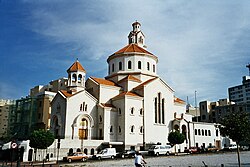
This is the list of cathedrals in Lebanon sorted by denomination.

This is the list of cathedrals in Lebanon sorted by denomination.
Cathedrals of the Catholic Church in Lebanon: [1]
Armenian Apostolic cathedrals in Lebanon:
Eastern Orthodox Church cathedrals in Lebanon: